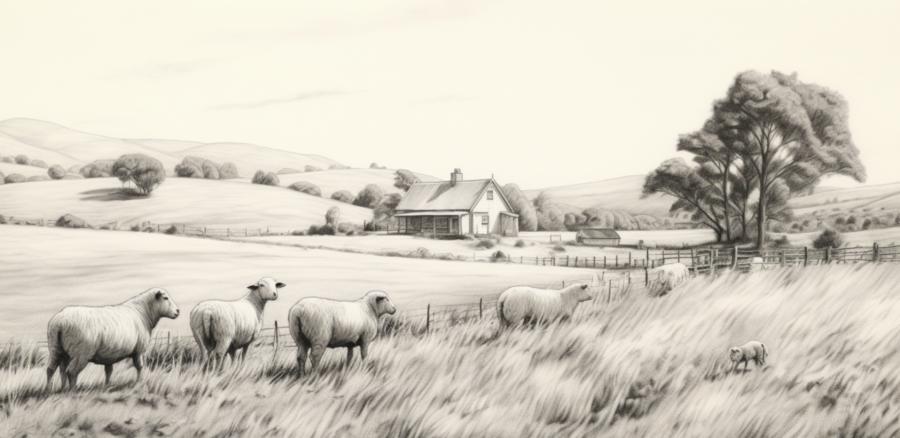The Woolly Frontier: A Homesteader's Guide to Sheep Shenanigans
 So you've got a patch of land that's greener than a kale smoothie and you're itching to populate it with something other than dandelions and existential dread. Enter the sheep, nature's lawnmower and a walking ball of woolly potential.
So you've got a patch of land that's greener than a kale smoothie and you're itching to populate it with something other than dandelions and existential dread. Enter the sheep, nature's lawnmower and a walking ball of woolly potential.Ah, sheep. Those bleating, grazing, four-legged fluff balls that seem to have been designed by a committee of toddlers. They're the livestock equivalent of a cozy sweaterówarm, comforting, and occasionally itchy. But before you start imagining yourself as the lord or lady of your own pastoral paradise, let's get one thing straight: sheep are not just animated pillows. They're complex beings with needs, desires, and a knack for getting into places they shouldn't. Like your neighbor's garden. Or your kitchen.
Now, you might be thinking, "Why sheep? Why not something more manageable like chickens or goldfish?" Well, for starters, sheep are multi-talented. They provide wool, milk, and meat, and they're excellent at keeping your grass trimmed. Plus, they're easier to herd than cats and less likely to eat your shoes than a dog.
But let's not kid ourselves. Sheep are not for the faint of heart or the short of patience. They require food, shelter, and medical care. They also need to be sheared, which is a bit like giving a haircut to a wriggling toddler armed with a pair of garden shears. It's a skill, and like all skills, it requires practice, patience, and a good sense of humor.
So, you've got your sheep, your land, and a dream. What's next? Infrastructure. You'll need a barn or at least a sturdy shed, fencing that's more Fort Knox than picket, and a water source that's not a mud puddle. And let's not forget about feed. Sheep are not picky eaters, but they do require a balanced diet. This means hay, grains, and a mineral supplement. No, pizza crusts and beer cans do not count as a balanced diet, no matter what your college roommate told you.
Now, let's talk money. Sheep are not a get-rich-quick scheme. They're more of a get-wool-slowly-and-hope-for-the-best kind of investment. The cost of feed, veterinary care, and shearing can add up. But if you're resourceful and willing to put in the work, you can turn a profit. Wool can be sold or spun into yarn, milk can be turned into cheese, and lambs can be sold or kept to expand your flock.
But perhaps the greatest benefit of owning sheep is the sense of accomplishment and connection to the land. There's something deeply satisfying about watching your flock graze peacefully in the setting sun, knowing that you've provided them with a good life. It's a feeling that can't be bought, only earned through sweat, tears, and the occasional bout of cursing.
So, if you're ready to take the plunge into the world of small-scale sheep farming, go ahead and do it. Just remember, it's not all frolicking lambs and Instagram-worthy sunsets. It's hard work, but it's also incredibly rewarding. And who knows, you might just find that you're a natural-born shepherd, ready to lead your flock to greener pastures and woollier futures.
Article kindly provided by valaisblacknosesheepcheshire.co.uk
Latest Articles
- Soundproofing Your Sanctuary: Innovative Acoustic Solutions for Sash Windows
- Mastering Kitchen Minimalism: Discover the Elegance of Simplicity
- Grow Your Own Microgreen Garden: Fresh Greens at Your Fingertips
- Hush Haven: Crafting a Quieter Home with Innovative Acoustic Solutions
- Bathroom Shield: The Science Behind Wetwall Panels and Mold-Free Bliss
- Tree Surgeons: Life Among the Branches
- The Invisible Allure of Quartz Worktops in Enhancing Kitchen Feng Shui
- How Skip Hire Services Promote Sustainable Practices
- Eco-Friendly Artificial Grass: Reducing Carbon Footprints at the Office
- Future-Proofing Your New Home: Preparing for the Next 50 Years
- Deep Clean, Deeper Benefits: The Professional Cleaning Advantage
- Smart Shopping for Home Decor: Why Quality Counts
- Sliding into Style: How Aluminium Bi-Fold Doors Can Transform Your Home
- Underfoot Adventures: Uncommon Kitchen Flooring Options and Savvy Installation Techniques
- Garden-Fresh Magic: Elevate Your Summer Dishes with Homegrown Herbs
- Beat the Heat with These Unconventional Kitchen Tools
- Pizza al Fresco: Crafting Your Dream Outdoor Pizzeria
- Hidden Costs of Skimping on Scaffolding: Quality Matters
- Bespoke New Build Properties: Customizing Your Dream Home
- Hidden Dangers: Uncovering Pest Hotspots in Unexpected Places at Home
- Interior Design
- Home Improvement
- Gardening
- Home Organization
- Home Maintenance
- DIY Crafts
- Kitchen and Dining
- Bathroom Design
- Home Security
- Home Automation
- Green Living
- Home Office
- Home Decor
- Garden Design
- Pet Care
- Home Technology
- Landscaping
- Home Energy Efficiency
- Home Cleaning
- Home Safety
- Home Exterior
- Home Insulation
- Home Buying
- Home Selling
- Renting
- Tradespeople
- Garage
- Bedroom
- Painting and Decorating
- Plumbing and Drainage

